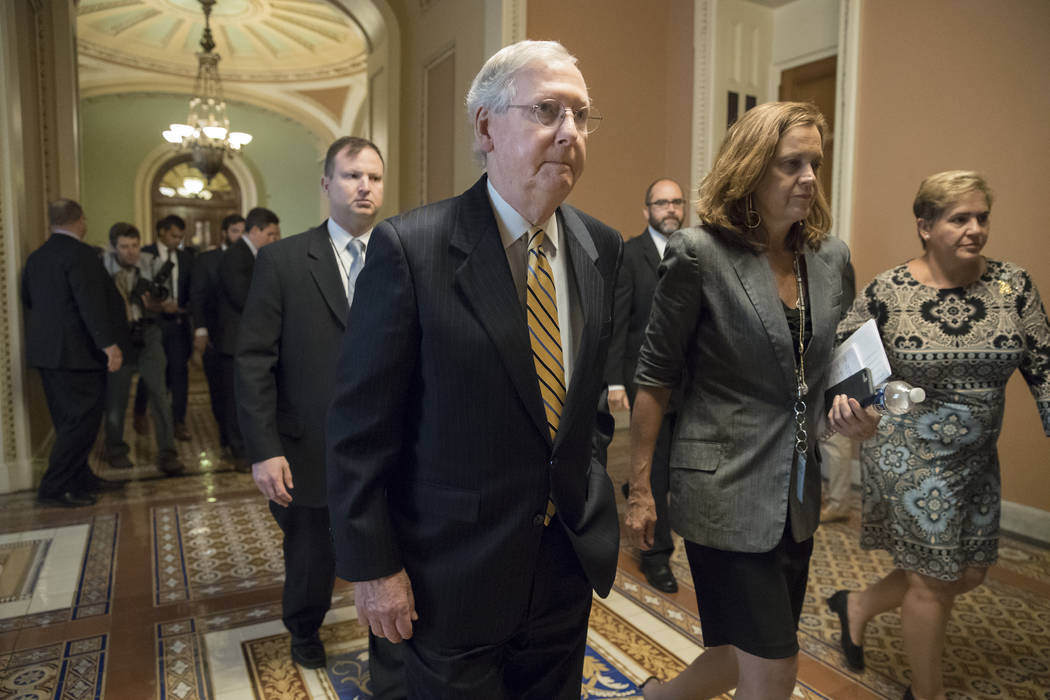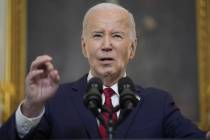GOP leaders push for Obamacare repeal over governors’ objection
WASHINGTON — Senate Majority Leader Mitch McConnell refused Tuesday to commit to a vote on a last-ditch effort to repeal Obamacare as opponents stepped up their efforts to kill the legislation.
A bipartisan group of 10 governors that included Nevada’s Brian Sandoval sent a letter to McConnell and Senate Minority Leader Charles Schumer, D-N.Y., urging the Senate not to take action on the latest GOP bill to repeal and replace the Affordable Care Act.
The letter puts Sandoval at odds with Sen. Dean Heller, R-Nev., a co-sponsor of the bill, after the two appeared together this summer to announce their opposition to an earlier Senate bill to repeal and replace Obamacare.
The governors wrote that only “bipartisan approaches can achieve true, lasting reforms.”
“We ask you to support bipartisan efforts to bring stability and affordability to our insurance markets,” the letter states.
The most recent GOP bill was filed last week by Republicans Heller, Lindsey Graham of South Carolina, Bill Cassidy of Louisiana and Ron Johnson of Wisconsin. President Donald Trump and House Speaker Paul Ryan, R-Wis., have endorsed the plan.
The bill would repeal the individual and employer mandates required by the ACA, commonly known as Obamacare, and repackage Medicaid expansion funds as block grants to states with flexibility for governors and state legislatures to craft local public coverage plans.
Graham said the bill would take the money and power out of the control of Washington and send it back to the states.
Heller said the states would be given the flexibility to “innovate, develop and implement new options to bring down costs and increase coverage.”
Shifting the financial burden
But the 10 governors who objected to the bill Tuesday raised concerns about the cuts in Medicaid spending that could shift the financial burden of coverage back to the states.
Schumer held up the letter at a news conference and said governors reject the Republican repeal plan because Washington makes the cuts and forces the states to do the cutting.
“Millions will lose coverage,” Schumer said. “That’s why this bill is so unpopular.”
Two previous Republican bills to repeal Obamacare died in the Senate. McConnell has told senators he would not bring another bill to the floor for a vote without the 50 votes needed, with Vice President Mike Pence casting a tie-breaking vote, to pass the bill.
The Senate majority leader repeatedly refused to commit to a floor vote during a weekly news conference Tuesday.
“We’re in the process of discussing all of this,” McConnell said.
Under budget rules, the Senate must act before the end of the fiscal year to repeal the law with a simple majority. Once the fiscal year expires, Republicans would lose the budget reconciliation rule and would need 60 votes to overcome a Democratic filibuster of the legislation.
“If we are going to go forward, we would have to act before Sept. 30,” McConnell said.
Republicans have vowed to repeal Obamacare since 2010, when Democrats pushed the legislation through the House and Senate on straight party-line votes.
GOP lawmakers have called a hearing on the Graham-Cassidy-Heller-Johnson bill for early next week in the Senate Finance Committee as they try to build momentum and secure the needed votes.
Impact on Nevada
Heller, a Finance Committee member, said Nevada wins under the bill “because it would be receiving more federal funding under this proposal and increased flexibility to help make sure people have access to quality care.”
But Sandoval has opposed all GOP plans to cut back on Medicaid expansion funding. In 2012, Sandoval opted to expand Medicaid coverage to newly eligible groups under the ACA. As a result, the Medicaid caseload grew by 50.6 percent in fiscal 2015 and by 7.2 percent in fiscal 2016.
Sen. Catherine Cortez Masto, D-Nev., said the new GOP bill would roll back Medicaid expansion gains in the state.
She cited a study by the left-leaning Center on Budget and Policy Priorities that found Nevada would lose $639 million in federal funds for Medicaid over a decade under the GOP bill.
“This means less care and higher costs for families, seniors and rural hospitals in our state,” Cortez Masto said.
The American Medical Association, said the Graham-Cassidy-Heller-Johnson legislation,similar to other GOP proposals considered by the Senate in July, would destabilize health insurance markets and decrease access to affordable coverage and care.
“We sincerely urge the Senate to take short-term measures to stabilize the health insurance market by continuing to fund cost sharing reduction payments,” said Dr. James Madara, the AMA CEO and executive vice president.
Sen. Lamar Alexander, R-Tenn., and Sen. Patty Murray, D-Wash., are writing a bipartisan bill to shore up the insurance markets and allow the Senate more time for craft a bipartisan health care reform bill.
The governors who sent the letter urged Senate leaders to take that approach.
In addition to Sandoval, other governors who signed the letter included Colorado Democrat John Hickenlooper, Ohio Republican John Kasich and Alaska independent Bill Walker.
Arizona Gov. Doug Ducey, a Republican, endorsed the Graham-Cassidy-Heller-Johnson bill on Monday, saying it was the right legislation to repeal Obamacare.
Contact Gary Martin at 202-662-7390 or gmartin@reviewjournal.com. Follow @garymartindc on Twitter.
Contact Sean Whaley at swhaley@reviewjournal.com or 775-461-3820. Follow @seanw801 on Twitter.
The Graham-Cassidy-Heller-Johnson legislation:
- repeals individual and employer mandates.
- repeals medical device tax.
- gives states ability to waive regulations.
- redistributes Medicaid expansion funds through block grants.




























